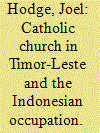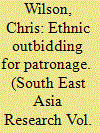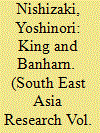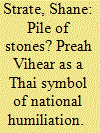|
|
|
Sort Order |
|
|
|
Items / Page
|
|
|
|
|
|
|
| Srl | Item |
| 1 |
ID:
120008


|
|
|
|
|
| Publication |
2013.
|
| Summary/Abstract |
This paper analyses the existence of Shi'ite women in Indonesia as a religious minority group. Although studies of numerous aspects of women's lives and organizations in an Indonesian context are increasing, there have been few on issues of religion and women, particularly on women from minority religious groups. It is only in the last few years that scholars have paid more attention to women's divisions of Muslim organizations, focusing mainly on Sunni Muslim women's organizations such as Aisyiyyah, Muslimat NU, Persistri and Al-Irsyad. However, information on gender and women's roles in minority religious groups is still hard to find. The paper fills this gap by working towards a better understanding of the position and the role of Shi'ite women in their Shi'ite community and within the Indonesian community in general. The subject of the study is Fathimiyyah, the women's division of Ikatan Jamaah Ahlul Bait Indonesia (IJABI, the Indonesian Council of Ahlul Bayt Associations), an Indonesian Shi'ite organization founded in 2000.
|
|
|
|
|
|
|
|
|
|
|
|
|
|
|
|
| 2 |
ID:
120009


|
|
|
|
|
| Publication |
2013.
|
| Summary/Abstract |
During the Indonesian occupation of Timor-Leste (1975-99), the Roman Catholic Church grew in importance to the East Timorese people. This is demonstrated by the large increase in Timorese affiliation to the Church: 25-30% of the populace were baptized Catholics in 1975 compared with over 90% in the 1990s. Various explanations have been offered for this growth, many of which identify 'extrinsic' factors such as the religious prescriptions of Indonesian law or the pressures of Islamization. While acknowledging the importance of these factors, this paper argues that certain intrinsic factors substantially influenced the identification of the Timorese experience of occupation with Catholic faith and solidarity. An understanding of these intrinsic factors can provide a more expansive understanding of Timorese culture, experience and history. Drawing on original research into the faith and experience of Timorese people during the occupation, the author explores the relationship between suffering, resistance and the Catholic faith of the Timorese in four areas: language; 'a spirituality of resistance'; martyrdom; and sanctuary and advocacy for the persecuted. The paper draws on the insights of French philosopher and literary critic, René Girard, regarding the importance of Christianity in the context of violence. Girard has argued for a particular understanding of the centrality of the victim in human culture and of how Christianity helps to reveal this centrality. Girard's perspective sheds light on how the Timorese came to terms with their experience of suffering and violence under Indonesian occupation through their identification with Jesus Christ and the Church.
|
|
|
|
|
|
|
|
|
|
|
|
|
|
|
|
| 3 |
ID:
120004


|
|
|
|
|
| Publication |
2013.
|
| Summary/Abstract |
The resilience of Asian firms in the face of the current economic downturn in North America and Western Europe is attracting renewed attention to the role of government in sustaining firm competitiveness. The paper adds to this debate by drawing from institutional theory to assess the impacts of selected formal government institutions on business performance in the Philippines. Based on a large-scale survey (n = 658) of business owners in the Philippines undertaken by the World Bank, the study finds that access to finance, the rule of law and regulatory quality contribute significantly to business performance. The policy implications of the findings are fully discussed, along with avenues for future research.
|
|
|
|
|
|
|
|
|
|
|
|
|
|
|
|
| 4 |
ID:
120007


|
|
|
|
|
| Publication |
2013.
|
| Summary/Abstract |
Do local systems of patronage in Indonesia cause or prevent intercommunal violence? In analysing the September 2010 ethnic riots in Tarakan, East Kalimantan, this article illustrates one mechanism by which clientelism can lead to violent communal conflict. Ethnic organizations claiming to represent the marginalized indigenous community engaged in a form of 'ethnic outbidding' in order to intimidate their way into local patronage networks. Apparent leadership of an aggrieved indigenous community gave organizations access to state resources that they would not otherwise have had. In order to sustain this status, however, these organizations were obliged to respond vigorously to any apparent insults to the community, thereby increasing the risks of intercommunal conflict.
|
|
|
|
|
|
|
|
|
|
|
|
|
|
|
|
| 5 |
ID:
120006


|
|
|
|
|
| Publication |
2013.
|
| Summary/Abstract |
Duncan McCargo's influential model of 'network monarchy' enables us to understand how King Bhumibol Adulyadej has mobilized his nationwide patronage network to shape contemporary Thai politics. This model, however, focuses mainly on the conflicts between reform-minded virtuous leaders (represented by Bhumibol) and unprincipled, self-serving politicians, and pays insufficient empirical attention to the porous boundaries between the two. The author makes up for this weakness by unravelling the historical process through which Bhumibol has developed a symbiotic, if ambiguous, relationship with Banharn Silpa-archa, regarded as the epitome of unscrupulous rural-based politicians. The author shows that the two have used each other for their respective political purposes. In an effort to protect and advance his personal and dynastic interests, Bhumibol has found it necessary and expedient to rely on Banharn as a valuable political ally. Banharn, for his part, has relied on the king and his proxies to legitimate and consolidate his authority at the local level. By casting light on this interdependence between the two seemingly contrasting types of leader, the paper contributes to a further elaboration of McCargo's model and, more generally, to a deeper understanding of the complexity of Thailand's patronage politics.
|
|
|
|
|
|
|
|
|
|
|
|
|
|
|
|
| 6 |
ID:
120003


|
|
|
|
|
| Publication |
2013.
|
| Summary/Abstract |
Cambodia has established a special tribunal to try former Khmer Rouge cadres. For such a transitional justice programme, local ownership is deemed to be crucial. This article assesses public perceptions of the tribunal by analysing interactions between local participants and tribunal officials in public forums held by a local non-governmental organization (NGO). In doing so, it identifies sound reasons for Cambodians' pervasive indifference, as indicated in preceding surveys. The article has implications for the ownership of transitional justice programmes, suggesting that such nationwide forums must be recognized as a unique device for eliciting local perceptions, because they differ from traditional mainstream survey methods.
|
|
|
|
|
|
|
|
|
|
|
|
|
|
|
|
| 7 |
ID:
120005


|
|
|
|
|
| Publication |
2013.
|
| Summary/Abstract |
The most recent border tensions between Thailand and Cambodia represent only the latest round of conflict over the status of Preah Vihear (Thai: Phra Viharn). This article uses newspaper and archival material to explore the modern history of the temple, largely from the Thai perspective, and focuses on how Preah Vihear has become the centrepiece of a Thai discourse on National Humiliation. Beginning with Prime Minister Phibun Songkhram's irredentist campaign of 1940, the Thai have associated these ancient ruins with the legacy of Western imperialism, particularly the territory 'lost' to French Indochina. For Thai nationalists, the 1962 international court case that awarded sovereignty over the temple site to Cambodia is an example of neo-imperialism that is part of this legacy. Thai media coverage of the court case compared the Preah Vihear situation with past defeats, including the loss of the four provinces in 1946 and the Franco-Siamese crisis of 1893. Conversely, Sihanouk and Cambodian leaders constructed a counter-narrative that compared Thai claims to Preah Vihear with the long history of Siamese imperialism in the region. It is Preah Vihear's centrality in National Humiliation discourse, rather than its religious or architectural significance, which makes it a powerful icon.
|
|
|
|
|
|
|
|
|
|
|
|
|
|
|
|
|
|
|
|
|